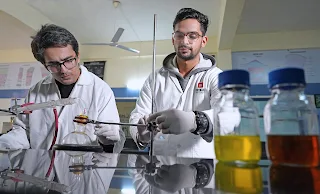Enroll in a three-year Bachelor of Culinary Management degree programme at Chitkara University, with the option of transferring after two years of study in India to George Brown College in Canada and graduating with an Honours B.Com degree in Culinary Management from George Brown after four years (2+2).
Chitkara University offers a Bachelor of Science in Culinary Management programme that is designed to provide students with a thorough understanding of the culinary industry as well as the skills needed for success in a managerial position. To provide students with a comprehensive education, the programme combines theoretical knowledge with practical training.
Food industry, nutrition, food quality, food managed services, event management, and corporate finance are all covered in the curriculum. Students also get hands-on experience in Chitkara's cutting-edge culinary laboratories and kitchens, in which they learn about different cuisines, culinary methods, and cooking equipment.
Graduates of the programme will be prepared to work in a variety of culinary and food service management jobs, including restaurant manager, service industry director, serving food manager, as well as culinary instructor. Experienced faculty who really are enthusiastic about the culinary arts and also have extensive industry knowledge teach the programme. Chitkara University also has partnerships with best culinary school systems and industry leaders, giving students access to internships and job placements as well as valuable networking opportunities.
Benefits Bachelor in Culinary Management
A Bachelor's degree in Culinary Management from Chitkara University can provide students with a variety of benefits, including:
Comprehensive education: The programme covers a wide range of culinary and hospitality management topics, providing students with a thorough understanding of the industry.
Hands-on training: Students have access to Chitkara's cutting-edge culinary labs and kitchens, where they're able to gain practical experience in a variety of culinary methods, cuisines, and equipment.
Industry connections Chitkara University has collaborations with top culinary school systems and industry executives, giving students beneficial networking opportunities as well as access to careers and job placements.
Career options: Graduates can work as restaurant managers, food service directors, catering managers, and culinary instructors in the culinary and hotel industry.
Entrepreneurship opportunities: Graduates can also start their own businesses in the culinary industry, such as restaurants, catering companies, or food product development.
Industry demand: The culinary and hospitality industries are growing, and there is a demand for skilled professionals who can manage operations effectively.
Transferable skills: The skills learned in culinary management, such as leadership, communication, problem-solving, and teamwork, can be applied to other industries as well.
Conclusion-
Chitkara University's Bachelor's degree program in Culinary Management offers a comprehensive education that combines theoretical knowledge with hands-on training in state-of-the-art culinary labs and kitchens. Graduates of the program can pursue a range of career opportunities in the culinary and hospitality industries, such as restaurant manager, food service director, catering manager, culinary instructor, and food product developer. Additionally, the program provides students with valuable networking opportunities through partnerships with top culinary schools and industry leaders. Overall, completing a Bachelor's degree in Culinary Management from Chitkara University can provide students with the skills, knowledge, and experience needed to succeed in a management role in the culinary industry.











